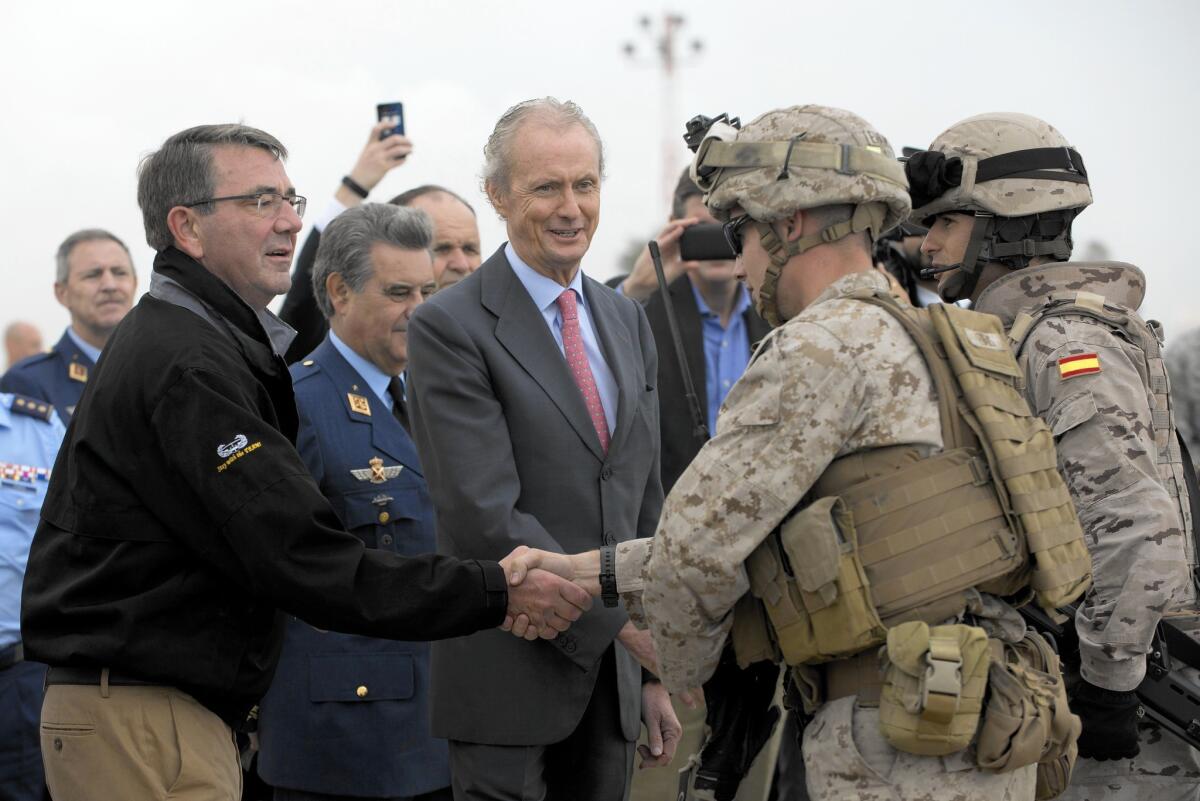NATO members on eastern flank seek defense boost from alliance

- Share via
Reporting from Rome — NATO members from the Baltic states and Eastern Europe will use their annual ministerial meeting this week to seek greater support from the West to modernize their defenses against a resurgent Russia.
Estonia, Latvia and Lithuania and other former Soviet bloc nations now in the North Atlantic Treaty Organization will ask the alliance to boost defenses on their eastern flank when U.S. Defense Secretary Ashton Carter arrives in Brussels for meetings Thursday at the organization’s headquarters.
Aides said Carter is making his second visit to NATO this year to emphasize continued U.S. support for frontline nations that feel vulnerable after Russia’s intervention in Ukraine.
With NATO backing, most have increased border patrols and added other defenses since 2014, when Russian troops seized Crimea and a conflict erupted in eastern Ukraine that the alliance blames on Moscow.
“To the east, Russia has used political, economic and military tools to undermine the sovereignty and territorial integrity of neighboring countries,” Carter said Monday at the Spanish Defense Ministry in Madrid, the first stop on a five-day trip to Europe. “We will take all necessary steps to deter Russia’s malign and destabilizing influence, coercion and aggression.”
He is likely to get an earful from some NATO allies. In an email, Latvian Foreign Minister Edgars Rinkevics said, “We need to ensure that there is substantial increase of NATO’s military presence, sending a clear signal to Russia about NATO’s determination to protect each and every ally.”
The annual summit is being held as NATO stages its largest military exercise in more than a decade. Trident Juncture, as the exercise is called, involves 60 ships, 200 aircraft and more than 36,000 troops — including 3,000 from the U.S. — from more than 30 NATO and non-NATO nations.
NEWSLETTER: Get the day’s top headlines from Times Editor Davan Maharaj >>
Over the last 18 months, the Obama administration has added resources to the region to help reassure nervous allies. Last month, in a bit of high-profile theatrics, the Air Force sent four new F-22 fighter jets to Estonia for a day as a show of force.
NATO also has expanded its presence and activities in response to the Russian intervention in Ukraine, as well as its increased air and naval patrols in the Arctic.
“The understatement of the day is that there is a considerable asymmetry between Norwegian and Russian military power in the North,” Norway’s defense minister, Ine Eriksen Soereide, said at the Atlantic Council think tank in Washington on Sept. 25.
Norway depends on NATO for security, she said. “But we need a NATO that is credible and capable. Thus NATO needs to evolve to meet the evolving security situation.”
NATO has boosted air policing missions over allied nations that don’t have their own fighter jets. NATO aircraft have flown over Albania and Slovenia as well as the Baltic region, where NATO F-16s have intercepted Russian aircraft.
The Western alliance also has established “force integration units,” each with a few dozen staffers, in Bulgaria, Lithuania, Estonia, Latvia, Poland and Romania.
“Quite naturally the eastern allies, who have felt the hug of the bear in the past, are more suspicious” of Russia’s goals, said retired Adm. James Stavridis, a former supreme commander of NATO who is dean of the Fletcher School of Law and Diplomacy at Tufts University.
Russia’s “invasion and annexation of [territory in] a European sovereign nation” have left little doubt of its intentions, he said.
During his last visit to NATO headquarters in June, Carter said the Pentagon would contribute special operations forces, weapons and equipment to a new alliance-wide rapid-reaction force.
Based in Germany, the force has air, naval and intelligence components and claims it will be ready to respond within 72 hours should Russia push into allied territory. Each of the alliance’s 28 member nations, including the United States, contribute troops on a rotating basis.
“The Eastern Europeans have only been free of Soviet occupation for 25 years,” said Christopher Harmer, a military analyst at the Institute for the Study of War, a nonpartisan public policy group in Washington. “That memory is still fresh.”
ALSO
In India, a legend keeps a town nearly door-free
Top U.S. commander in Afghanistan says attack on hospital was a mistake
Israel demolishes homes of Palestinian attackers; clashes persist
More to Read
Sign up for Essential California
The most important California stories and recommendations in your inbox every morning.
You may occasionally receive promotional content from the Los Angeles Times.











